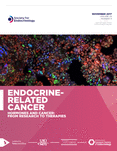Thyroid hormone, thyroid hormone receptors, and cancer: a clinical perspective
- Division of Laboratory Research, Department of Endocrinology and Metabolic Diseases, University of Duisburg-Essen, Hufelandstraße 55, 45127 Essen, Germany
- Correspondence should be addressed to L C Moeller; Email: lars.moeller{at}uni-due.de
Abstract
Thyroid hormones (THs) may play a role in diseases other than hyper- and hypothyroidism. Several lines of evidence suggest tumor-promoting effects of TH and TH receptors. They are possibly mediated by phosphatidylinositol-3-kinase and MAPK and involve among others stimulation of angiogenesis via αvβ3. Thus, an increased risk for colon, lung, prostate, and breast cancer with lower TSH has been demonstrated in epidemiological studies, even suggesting a TH dose effect on cancer occurrence. Furthermore, higher TH levels were associated with an advanced clinical stage of breast and prostate cancer. In rodent models, TH stimulated growth and metastasis of tumor transplants, whereas hypothyroidism had opposite effects. In clinical studies of glioblastoma and head and neck cancer, hypothyroid patients showed longer survival than euthyroid patients. Also, patients with renal cell cancer that were treated with the tyrosine kinase inhibitor sunitinib and developed hypothyroidism in due course showed significantly longer survival than patients that remained euthyroid. Development of hypothyroidism was an independent predictor for survival in two studies. Yet, it is still possible that hypothyroidism is only a surrogate marker for treatment efficacy and does not positively influence treatment outcome by itself. Future cancer treatment studies, especially with substances that can induce hypothyroidism, should therefore be designed in a way that allows for an analysis of thyroid function status and its contribution on treatment outcome.
- Revision received 20 December 2012
- Accepted 3 January 2013
- Made available online as an Accepted Preprint 14 January 2013
- © 2013 Society for Endocrinology












